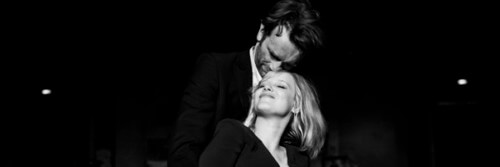Cold War (2018) Review
Cold War (2018)
Director: Pawel Pawlikowski
Screenwriters: Pawel Pawlikowski, Janusz Glowacki, Piotr Borkowski
Starring: Joanna Kulig, Tomasz Kot, Borys Szyc, Agata Kulesza
From the very opening shots of Polish folk singers performing directly into the eye of the camera through some of the most beautifully photographed black and white footage you’ll likely see anywhere, itself projected in the more traditional (and narrower) 4:3 aspect ratio, Cold War beckons the soul to a treat as beautiful and tragic as the greatest romances of Hollywood’s golden era, offering something so artistically satisfying, tantalisingly layered and beautifully constructed that this may finally be the proof needed that there are no better filmmakers on the planet than Pawel Pawlikowski at this moment. This latest film, a Cannes Best Director earning work, is a piece of sheer genius, an indescribably fulfilling cinematic venture that releases the great man’s ouevre from the shackles of inaccessibility without losing a shred of his unique aura and credibility; a movie that could be likened to the great works of Andrei Tarkovsky and akin to a more intimate David Lean release.
This snug sub-ninety minute romance loosely based on the lives of the screenwriter-director’s own parents, which plays across multiple European countries operating under vastly different political regimes and social norms over two decades in the aftermath of the 2nd world war, is performed by leads Tomasz Kot and particularly Joanna Kulig with an old fashioned but not out of date classical style that brings with it an immense focus unto the developments in their relationship and the ongoing silent conflicts of the time, as if shining a large spotlight on the way little things can have such a huge and profound impact on our usually ordinary and certainly finite lives. Kulig’s phenomenal lead performance as a woman torn by two worlds just as Europe itself was at the time is so beautifully encapsulated in a moment in which she, being older, more cynical and certainly more depressed than at the beginning of the film, falls to her knees in a bathroom and removes the black wig she has been wearing as if releasing herself from the imprisoning nature of her doomed marriage, her professional obligations and the expectations of communist ruled Eastern Europe all at once, choosing at this moment to embrace the one constant, unmoving yet always evolving presence in her life, love.
Pawlikowski earns this moment with every frame of his film, developing an atmosphere from the opening sequence that seems haunted by the coming tragedies of which the characters shall endure, and the very present ramifications of the war they do not speak of. In many ways, Cold War feels like a ghost story. It happens into the world two spirits who, by divine intervention, become subject to the desires of a higher power in the aftermath of vast tragedy and thus float through the world via song, dance and their love for one another until each signifier of hope is all but lost to the passing of time and the war neither of them feel a part of, despite how changed by it they have undoubtedly been. It is through this under-arching darkness that Pawlikowski offers a narrative that mirrors that of his over-arching romance with a tragedy centred specifically around his female lead; a character whose entire life is bound by sexism, politics and objectification, a true casualty of war and the ways in which oppressive regimes only grow in their extremes with the threat of impending doom. She is, throughout, an unmoving free spirit filled with passion and self-worth whose increasing strength throughout the picture acts as a useful juxtaposition to the ongoing demise of her lover who is first taken by the evils of his own empowerment and subsequently destroyed as the results of his own regret.
It is through these two ongoing thematic explorations of romance and war that Cold War’s most vital questions are asked and that we are encouraged to wonder whether there is anything more transcendent of our own mortality, and remarkable yet equally unimportant life journeys, than love. This is a film that poses a lot of questions and leaves niggling thoughts to unravel in your brain; a movie firmly knotted to the idea that some parts of us are unflinching even in the face of immense stress, tragedy and war. This is a love story for the ages with all of the fat trimmed from the sides; a narrative, a picture, a set of performances and a combination of musical arrangements that work together in unison to form this piece of almost indescribable beauty and impact.
Float through the story of Zula and Wiktor as they float through time and space in this phenomenal modern masterpiece by one of the great auteurs of our age.
Score: 24/24


